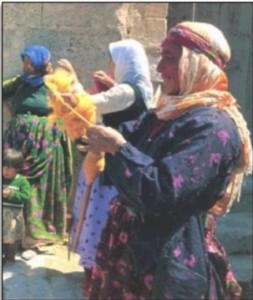
Image credit
“And all the skilled women spun with their own hands, and brought what they had spun, in blue, purple, and crimson yarns, and in fine linen. And all the women who excelled in the skill spun the goat’s hair.” Ex. 35:25-26
After leaving Egypt, God directed Moses to prepare a portable sanctuary, a tabernacle. This became a sacred place where the wandering Hebrew people could commune with God. We learn in Exodus that skilled women prepared the woven materials needed for the tabernacle. Later these highly trained weaving women worked within the temple compound. In Hebrew, the word used for “skilled” is related to the word “wisdom.” Culturally, the Hebrews saw the technical abilities of artisans as a form of profound understanding. Thus we find that women’s traditional work of weaving was highly prized not just for the domestic and economic benefits but for religious and spiritual reasons as well. “When textiles were needed for ritual purposes, as in the case in the tabernacle texts, women’s skills in preparing fabrics and converting them to specific forms situates them in positions of social or religious prominence; it gives them a public role that has been little noticed” (Carol Meyers). Continue reading Women Who Made Veils for the Tabernacle and the Temple in Jerusalem →



